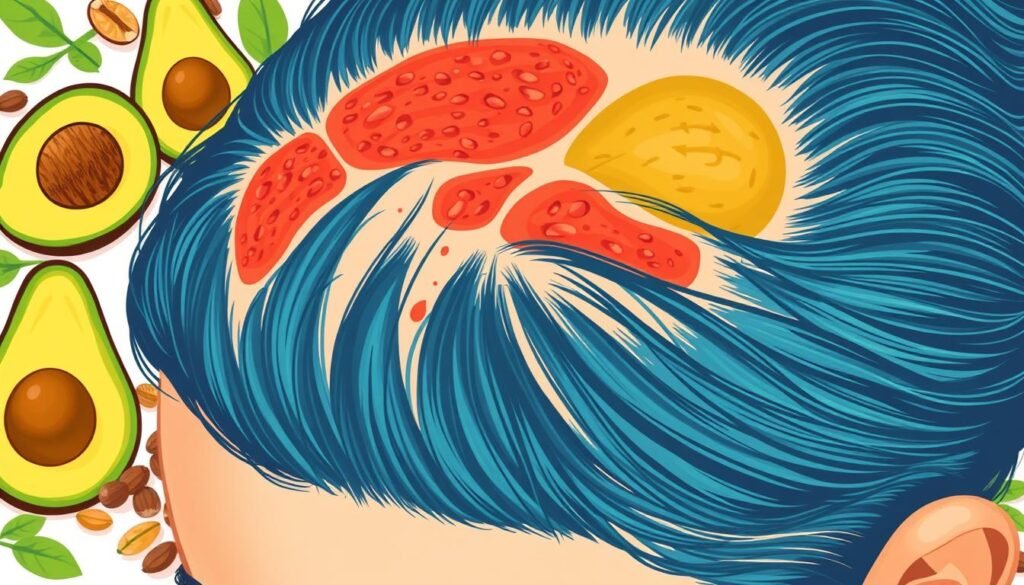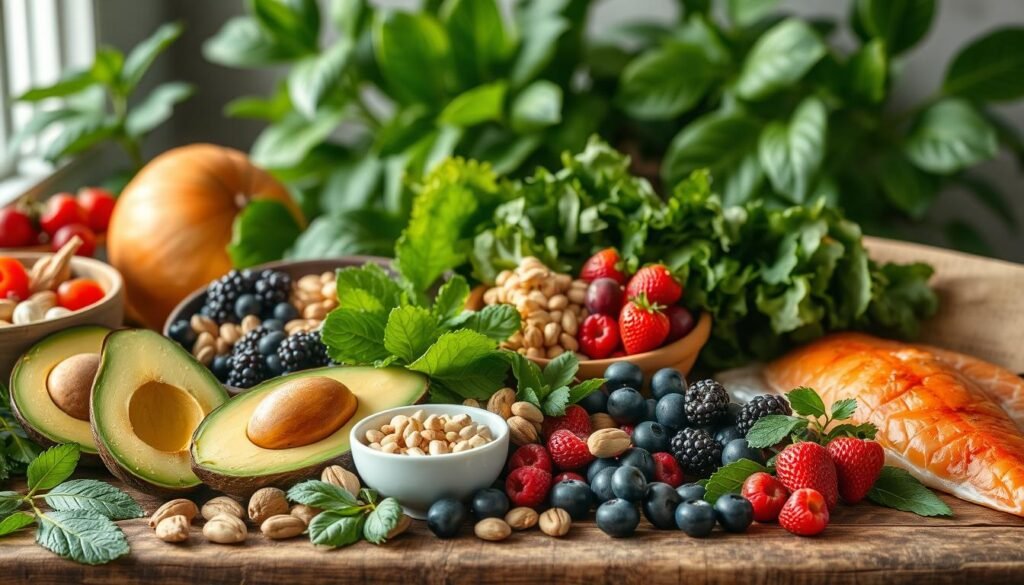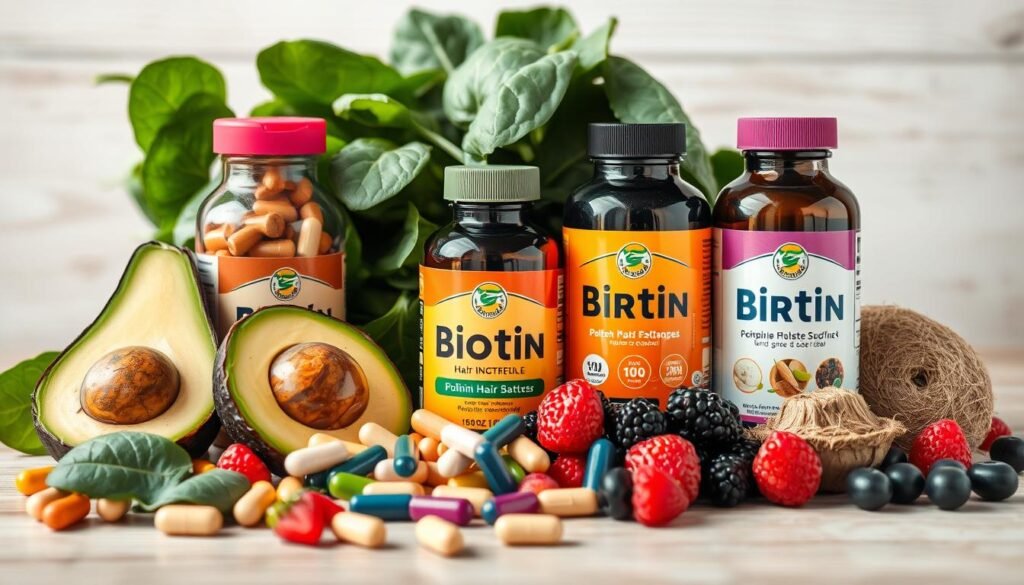Did you know that nearly one-third of people in the U.S. might lack certain vitamins?1 This fact highlights an important area of hair health: not getting enough nutrients. Some vitamins are key to preventing dandruff, which a fungus called Malassezia Globosa can cause. Knowing this helps us choose foods that make our scalp healthier and can lower dandruff.
Key Takeaways
- Nutrient deficiencies can lead to significant scalp issues, including dandruff.
- Vitamin D and B12 deficiencies are the most common among the population.
- Women aged 19-50 are particularly vulnerable to vitamin deficiencies.
- Certain vitamins like B2, B3, B6, and B7 are crucial for maintaining a healthy scalp.
- Malassezia Globosa sensitivity affects about 50% of the population.
- Addressing nutrient deficiencies may help improve overall hair health.
Understanding Dandruff and Scalp Conditions
Dandruff is a common scalp problem that causes flaking and itching. It can come from dry skin, seborrheic dermatitis, or a fungal infection. As many as 42% of infants and 50% of adults might face dandruff or seborrheic dermatitis at some stage. Men often have it more due to hormonal changes.
It’s crucial to know the signs of this issue. These include seeing flakes on your clothes and feeling an itchy scalp. Learning about the causes, such as skin irritation or genetics, can help. Also, lacking certain nutrients might make it worse. Vitamins like zinc and B vitamins are key for healthy hair and scalp. For more advice on dealing with dandruff, check out WebMD’s dandruff guide.
Nutritional habits also play a role in scalp health. Good hair care, the right shampoos, and a balanced diet can improve conditions. Dandruff can be dry or oily, each needing different treatment. Knowing how dandruff links to your health lets you tackle the issue head-on.
| Type of Dandruff | Characteristics | Management Strategies |
|---|---|---|
| Dry Dandruff | Small, white flakes; dry scalp | Moisturizing shampoos; regular scalp hydration |
| Oily Dandruff | Greasy flakes; oily scalp | Medicated shampoos; regular washing |
| Fungal Dandruff | Severe flaking; possible redness | Anti-fungal treatments; seek professional care |
If your scalp problems don’t go away, staying vigilant is important. By checking your scalp and using the right care methods, you can fight off dandruff symptoms.
The Role of Nutrition in Hair Health
Maintaining optimal Hair Health means looking at the role of Nutrition closely. A balanced diet is key for hair growth and a healthy scalp. It should include vitamins A, B, C, and D and minerals like zinc.
Missing these nutrients can cause problems. For example, not enough iron might lead to hair loss. Low levels of vitamin D can slow hair growth, and not enough biotin can affect hair and nails.
Protein is super important too; without it, hair gets weak and may fall out. Not having enough zinc can mess with hair growth cycles. Also, lacking omega-3 fatty acids can make the scalp dry and flaky. Tests can help pinpoint these nutrient gaps, so you can eat better.
To wrap it up, eating a variety of nutrient-rich foods boosts Hair Health. It also helps avoid the bad effects of not getting enough nutrients. Taking steps to eat well supports healthy hair and stops scalp problems before they start.
Common Nutrient Deficiencies Linked to Hair and Scalp Issues
Many nutrients directly affect our hair and scalp health. Key vitamins and minerals are crucial. If we don’t get enough, we may see hair and scalp issues. Knowing about these deficiencies helps us choose foods that keep our hair healthy.
Vitamin Deficiencies like A, B, C, and D are vital for our hair. For example, vitamin A helps produce sebum. This keeps the scalp moist and hair healthy. Without enough, you might get dry skin and dandruff problems.
Biotin is a B vitamin important for making keratin, which makes our hair strong. Not having enough B vitamins can cause hair loss and weak hair. Vitamin C is needed for collagen, making hair strong and protecting it. Lack of vitamin D can make hair loss problems like alopecia areata worse. This shows how important vitamins are for our hair.
Zinc is important too. It helps hair grow and repairs it, making sure the oil glands work well. If we don’t have enough zinc, our hair might start thinning, and our scalp could suffer.
By eating right or taking supplements, we can fix nutritional deficiencies. This improves our scalp and hair condition. It shows why it’s essential to get enough of these nutrients.
Nutrient Deficiencies and Dandruff: Causes and Effects
Dandruff can get worse if you don’t get enough of certain nutrients. Knowing which vitamins affect your scalp can help tackle dandruff effectively.
Vitamin A Deficiency
Vitamin A keeps hair follicles healthy and aids sebum production. If you lack Vitamin A, your skin may get dry and itchy, making dandruff worse. Eating foods like carrots, egg yolks, and salmon can improve your scalp’s health.
Vitamin B Deficiency
The B vitamins, especially B7 (biotin), B12, and B6, are key for healthy hair. A Vitamin B deficiency can cause your hair to become brittle, lead to hair loss, and more dandruff. Adding whole grains, lean meats, and dairy to your meals can help prevent these issues.
Vitamin C Deficiency
Vitamin C is important for producing collagen, which keeps your scalp in good shape. A lack of Vitamin C can weaken your skin’s barriers, leading to more dandruff. Citrus fruits, leafy greens, and bell peppers offer lots of Vitamin C.
| Vitamin | Role in Hair Health | Symptoms of Deficiency | Food Sources |
|---|---|---|---|
| Vitamin A | Maintains healthy follicles and sebum production | Dry scalp and aggravated dandruff | Carrots, egg yolks, salmon |
| Vitamin B | Supports healthy hair growth and scalp | Brittle hair, hair loss, dandruff | Whole grains, lean meats, dairy |
| Vitamin C | Helps in collagen synthesis | Weak scalp skin, increased dandruff | Citrus fruits, leafy greens, bell peppers |
The Connection Between Zinc Deficiency and Dandruff
Zinc is key for healthy scalp care. Not having enough can cause skin problems like dandruff. People with not enough zinc might see more flakes and redness. Seborrheic dermatitis and dandruff often go hand in hand, showing a link between them.
Dandruff can come from many places, like your genes, stress, and what you eat. Eating right, with plenty of zinc, helps your scalp. Spinach, mushrooms, and seafood are good for this. Adding them to your diet can help fight off dandruff. Plus, vitamins with zinc are great for your scalp health.
Tackling dandruff works best when you look at the whole picture. Supplements with zinc boost your diet and help your scalp. Supplements also help fight off germs and keep your scalp’s natural balance. For tips on what to eat for a healthy scalp, check out this useful guide. It also talks about what everyday foods can help.
Zinc is important for dandruff care, but it’s not the only answer. A good lifestyle, less stress, and careful use of hair products also matter. A balanced diet supports a strong immune system. This can fight off problems like Malassezia yeast overgrowth. Diet and using the right products together work best.
| Nutrient | Recommended Daily Intake | Food Sources |
|---|---|---|
| Zinc | 9.5 mg (Men), 7 mg (Women) | Shellfish, meat, legumes, seeds, nuts |
| Vitamin B | Varies by type | Whole grains, eggs, dairy, leafy greens |
| Omega-3 Fatty Acids | 1.6 g (Men), 1.1 g (Women) | Fish, flaxseed, walnuts |
Understanding Seborrheic Dermatitis
Seborrheic dermatitis is a common skin problem, especially on oily parts like the scalp. It shows up as greasy or scaly patches, with redness and lots of itching. It’s more common in cold, dry weather but gets better in summer because of more sun.
Malassezia, a yeast on our skin, grows too much in those with seborrheic dermatitis. It’s hard to manage if you have Parkinson’s disease or HIV. There are treatments like diets that lessen yeast to help with symptoms.
Eating more omega-3 fatty acids can lower inflammation linked to seborrheic dermatitis. Taking biotin supplements, about 5 to 10 mg daily, may also help people dealing with this issue.
Tea tree oil at 5% strength can fight the yeast causing seborrheic dermatitis. Aloe vera and Quassia Amara are great for their anti-inflammatory and antifungal effects. Avocado oil helps with scaling and fights fungus, too.

Seborrheic dermatitis is seen in babies under three months and adults from 30 to 60. Most have mild symptoms, and some are barely affected. Treatments like anti-inflammatories, solutions that remove dead skin cells, and antifungals exist. Knowing about seborrheic dermatitis and scalp health helps people choose the right diet and treatments.
Symptoms of Nutritional Deficiencies
Learning about the symptoms of nutritional deficiencies can make you more health-aware. Look for signs in your hair and scalp. They can show if you need to change your diet.
Brittle Hair and Nails
Brittle hair can mean you’re not getting enough biotin or protein. Without these, your hair can get weak and you might lose more of it. Your nails can become brittle too, pointing to bigger health issues. These signs should make you rethink your diet.
Flaky Scalp and Dandruff
A flaky scalp could be from not having enough B2, B6, or D vitamins. This problem shows as dandruff, affecting how you look and feel. To fix it, improve your diet to boost scalp health and lessen dandruff. If you have this issue, check if you’re getting the right nutrients for a healthier scalp.
How to Improve Hair Health Through Nutrition
A healthy diet is key to having great hair. Eating right can make your hair look alive and fight off dandruff. Vitamins A, C, E, zinc, and omega-3s are super important for this.

Adding a mix of foods to your diet can really help your hair. Here’s what to eat:
- Green Leafy Vegetables: They’re packed with vitamins A and C, which keep your hair looking good.
- Fatty Fish: Salmon and similar fish have lots of omega-3s, which help keep your scalp moist.
- Nuts and Seeds: Things like almonds and sunflower seeds are full of vitamin E, making your hair strong and shiny.
- Whole Grains: They have B vitamins, which are essential for growing hair.
- Fruits: Strawberries have a lot of vitamin C, which helps make collagen and keeps your hair healthy.
Knowing which foods boost hair health is really useful. For example, a sweet potato has more than enough vitamin A for daily needs. It helps keep your scalp healthy and dandruff-free. An avocado provides a lot of your daily vitamin E, making your hair shiny and strong.
If you want to get rid of dandruff and have lively hair, focus on a balanced diet. Eating right not only makes your hair look better but also boosts your confidence.
Natural Food Sources for Essential Nutrients
Finding Natural Food Sources for key nutrients is key to not just overall health but also hair and scalp health. Eating foods rich in Vitamin B and Omega-3 Fatty Acids improves hair and cuts down on dandruff.
Foods Rich in Vitamin B
Vitamin B is crucial for healthy hair and scalp. Great Natural Food Sources are:
- Meat (such as pork tenderloin and beef)
- Poultry (like chicken and turkey)
- Eggs
- Dairy (low-fat options recommended)
- Whole grains (like oatmeal and brown rice)
- Beans and legumes
- Leafy greens and various fruits (oranges, bananas)
These food choices support hair growth and help keep hair follicles well-oxygenated.
Foods High in Omega-3 Fatty Acids
Omega-3 Fatty Acids fight inflammation, vital for scalp health. You should eat more of these Natural Food Sources:
- Fatty fish (such as salmon, mackerel, and sardines)
- Nuts (including walnuts and chia seeds)
- Ground flaxseeds
- Soybeans and canola oil
Adding these to your diet can boost scalp moisture and help fight dandruff. These changes can drastically better your hair’s health.
| Food Source | Key Nutrient | Benefits for Hair and Scalp |
|---|---|---|
| Salmon | Omega-3 Fatty Acids | Reduces inflammation, hydrates scalp |
| Chicken | Vitamin B | Supports red blood cell production |
| Oysters | Zinc | Strengthens hair follicles |
| Almonds | Vitamin E | Provides antioxidant protection |
| Spinach | Iron | Promotes hair growth |
The Benefits of Nutritional Supplements
Nutritional supplements play a big role in making hair healthier. This is especially true for those lacking certain nutrients, leading to dandruff. Supplements like biotin, vitamin D, and omega-3 fatty acids help fill the gaps in our diet. These nutrients are key for keeping hair follicles healthy and promoting hair growth.
Adding these supplements to your daily routine can offer many benefits:
- Vitamin D: It’s crucial for making new hair follicles. Without enough of it, you might see less new hair growth and more thinning.
- Biotin: This is super helpful for people who don’t have enough biotin. It can really help stop hair from falling out.
- Omega-3 Fatty Acids: These are great for fighting inflammation, which keeps your scalp healthy and reduces dryness.
- Iron and Protein: If you’re not getting enough of these, your hair might start thinning. They’re very important for preventing this.
Before you start taking any supplements, talk to a doctor or healthcare provider. They can help you figure out what you need. Not all supplements are created equal because the FDA doesn’t check them as closely as medicines. So, it’s really important to choose products from reliable brands.
| Nutrient | Deficiency Impact | Potential Benefits |
|---|---|---|
| Vitamin D | Hair loss and poor follicle health | Supports new hair follicle growth |
| Biotin | Hair thinning, especially in deficiency cases | Helps restore hair loss if deficient |
| Omega-3 Fatty Acids | Dandruff and dry scalp | Improves scalp health, reduces inflammation |
| Iron | Thinning hair and anemia | Promotes stronger hair growth |
| Protein | Weak, brittle hair | Supports hair structure and strength |

Conclusion
It’s vital to understand how Nutrient Deficiencies and Dandruff are linked to keep a healthy scalp. About half the adults deal with dandruff or seborrheic dermatitis. Knowing the importance of vitamins B, D, and E and minerals like zinc can really help your hair.
Improving what you eat and maybe adding supplements can better manage dandruff. Adding more variety to meals and whole foods are good steps. A registered nutritionist can offer great advice too. You can find more about how vitamins affect hair health here.
Knowing this lets people make choices that improve hair quality and look. Fight nutrient shortages to see healthier scalp and hair. Making smart choices based on knowledge can really change your hair for the better.